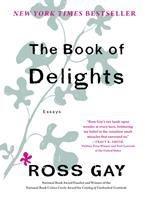
Poet Gay decided he would adopt a practice for a year of paying attention to what delighted him and writing a daily "essayette" recording his related thoughts. This is his compilation of those journal entries. He writes in the prologue how the habit helped him develop a kind of "delight radar," as he became more aware of the delightful aspects of life at all times and happier for it, and his joy is apparent on every page.
Gay writes with an intentionally free-flowing, rambling style (see the excerpt below). It captures the personality and spontaneity of his process, and readers come to know him, in some ways intimately, over the course of entries. Sometimes he stays focused on the delight, describing it in depth and what he takes from it; more often he meanders into related thoughts spurred by the moment, delving into memories or meditative, sometimes heavy, territory. Each digression brings its particular rewards. Themes emerge: gardening, friends and family, public spaces, physicality, racism, music. Gay comes across as personable and at least somewhat gregarious. Most importantly, Gay comes across. The pages portray a living, breathing, tangible person, modeling an inspiring process that brings readers their own significant share of delight.
A sample to give the flavor, from an essay that is neither as moving as some nor as insightful as others, but describes one of his very deliberate rules for the undertaking. From "Writing by Hand":
For these essays, though, I decided that I'd write by hand, mostly with Le Pens, in smallish notebooks. I can tell you a few things--first, the pen, the hand behind the pen, is a digressive beast. It craves, in my experience anyway, the wending thought, and crafts/imagines/conjures a syntax to contain it. On the other hand, the process of thinking that writing is, made disappearable by the delete button, makes a whole part of the experience of writing, which is the production of a good deal of florid detritus, flotsam and jetsam, all those words that mean what you have written and cannot disappear (the scratch-out its own archive), which is the weird path toward what you have come to know, which is called thinking, which is what writing is.
For instance, the previous run-on sentence is a sentence fragment, and it happened in part because of the really nice time my body was having making this lavender Le Pen make the loop-de-looping we call language. I mean writing. The point: I'd no sooner allow that fragment to sit there like a ripe zit if I was typing on a computer. And consequently, some important aspect of my thinking, particularly the breathlessness, the accruing syntax, the not quite articulate pleasure that evades or could give a fuck about the computer's green corrective lines (how they injure us!) would be chiseled, likely with a semicolon and a proper predicate, into something correct, and, maybe, dull. To be sure, it would have less of the actual magic writing is, which comes from our bodies, which we actually think with, quiet as it's kept.
